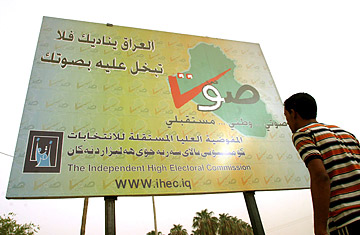
An Iraqi man reads a poster near an election station in Baghdad on Wednesday. The poster reads, "Iraq is calling you, don't keep your vote away, vote/ my vote, my country, my future ". E
Iraq's parliament finally agreed Wednesday on a law that will enable provincial elections to be held in the New Year — breaking a months-long deadlock over the vexed question of the fate of Kirkuk, the oil-rich northern city coveted by Iraq's Kurds, Arabs and its Turkoman minority.
Wednesday's unanimous vote paved the way for a provincial poll viewed by Washington as a key element in national reconciliation efforts. The deal stipulates that the elections, which were supposed to have been held in October, must now take place before the end of January in 14 of Iraq's 18 provinces. The three provinces in the northern semi-autonomous Kurdish zone, as well as the ethnically mixed city of Kirkuk (which the Kurds hope to incorporate) will have to wait until after March to head to the ballot box. The Parliament has mandated a seven-member committee to work with the United Nations to resolve the Kirkuk issue before the northern provinces vote. In other words, it punted.
Parliamentary speaker Mahmoud al-Mashhadani hailed the deal, saying that "Kirkuk was the source of troubles, but now it became a symbol of nationalism and agreement. It has united us." That may be a substantial overstatement, according to Kurdish legislator Abdel-Bari al-Zebari. He says the proposal, reluctantly agreed to by the Kurdish parliamentary bloc, hardly helps cement national unity. "We believe there should be one law covering all of Iraq, but other parties insisted on this, and in order to compromise, we had to give in," he said. "Taking one city and delaying the election in it, I don't think that's in the national interest." The Turkomen also didn't want a delay, but relented in the end.
Still, as one Sunni legislator put it, the country cannot "be held hostage to one issue." "It's not a perfect choice," he said, "but we have to move forward on other things." Although Kirkuk has been put on the back burner, the provincial elections in the rest of the country will help chart a new political landscape by indicating how much support Prime Minister Nouri al-Maliki and his rivals have within their own communities. In particular, the poll is likely to precipitate a struggle for Shi'ite hearts and minds between Maliki's supporters, loyalists of Abdel-Aziz al-Hakim and his Supreme Iraqi Islamic Council, and the movement of radical cleric Moqtada al-Sadr. The fiercest contest may be between al-Hakim and al-Maliki, because Sadr has announced that his movement will not contest these polls under their own banner, instead joining independent candidate lists, as they did in 2005.
